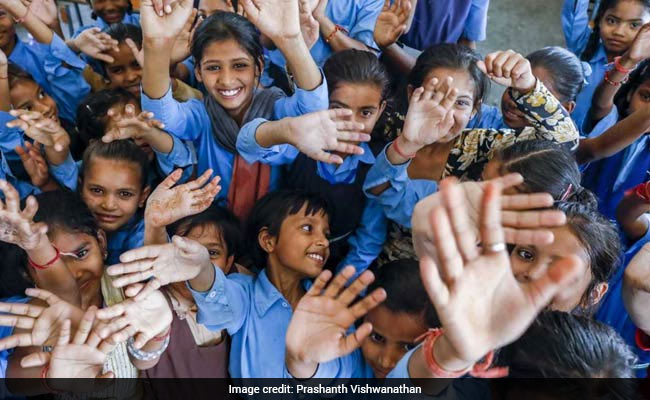New Delhi: “Yaad rahe, khaane se pehle aur shoch ke baad, sabun ka kare istemaal, saaf haatho ka dikhaaye kamal” (Remember, before eating food and after using the toilet, we should wash our hands with soap to prevent the spread of germs). This is the song the school children of South Delhi Municipal Corporation (SDMC) Primary School in New Delhi’s Raghubir Nagar recite on a regular basis (every 15 days) during the morning assembly to spread awareness on the importance of Water, Sanitation and Hygiene (WASH). The students do so as part of the hygiene curriculum introduced by the school in 2015 in association with Water Aid India and the Society for All Round Development to inculcate the habit of handwashing among the children. The school actually worked on the concept that if children at early age, quick to adapt and sustain changes, are taught the basic rules of good health and hygiene, they can become agents of change among their peers, families and communities.
Clean drinking water, using latrines, and washing hands are the simplest yet most concrete steps to prevent many diseases from spreading. These are essentially key habits that can be inculcated in children from a very young age. It helps improve cognitive function and attention, and also reduces days missed from school and increases dignity and safety, said a teacher of the SDMC Primary School while speaking to NDTV during the Season 5 launch of the Banega Swachh India campaign with Amitabh Bachchan on May 11.
How the school managed to make students the agents of change
The school faculty and other stakeholders first identified the WASH challenges in the school and then built an understanding among teachers and children on the importance of WASH friendly practices. As part of this exercise, they also formed children clubs or sanitation committees in the schools, which then enabled them to address issues such as dirty toilets and access to safe drinking water.
Also Read: Bathinda’s Municipal Body Tap School Students To Improve City’s Sanitation Coverage
Children have the right to basic facilities such as school toilets, safe drinking water, clean surroundings and also basic knowledge about hygiene. Yet, in our country, we lose 1.2 lakh children under the age of five to diarrhea every year. Moreover, we are home to 48.2 million stunted children (which mean they are shorter than normal for their age). And the main cause behind the prevalence of these diseases in India is poor sanitation and hygiene, said one of the school teachers.
To ensure that schools become WASH-friendly with adequate hygiene and sanitation facilities, the school developed a WASH curriculum in the school in April 2015.
“The hygiene curriculum is class-based modules on different components of WASH, such as personal hygiene, safe water, conservation of water, open defection, importance of hand washing, menstruation health management. These modules are interactive with different engagement activities such as poems, skits and stories, and are held regularly with the students. This helps students to not just learn but also remember and practice it regularly,” said Vinayak Nambiar, Program Coordinator, Society for All Round Development.
All the classes from nursery to Class 5 follow different curriculum to educate children on the basic hygiene for good health, said the teacher.
The regular hygiene education to children include the handling of drinking water, raised and covered storage with a dispenser tap or ladle; use of toilets; water quality-testing and treating with practical demonstrations; garbage disposal – activity-based education where children actually manage the garbage disposal in the school; recycling waste water (kitchen gardens where space is available or soak pits); and menstrual hygiene in upper primary schools and above (education, access to sanitary napkins, toilets with cleaning and pad disposal facilities).
A look at how the young guns are spreading the word about Swachh Bharat Abhiyan
Talking to NDTV, a school student said, “In my hygiene class, I learnt a lesson that I was washing hands in a wrong manner all my life. The class taught me how important the role of soap is while washing hands. We now wash our hands before eating, post using a toilet and even after playing in the playground. Whatever I have learned and whatever I am learning, on daily basis I tell it to all my friends back at home and my family.”
Students also conduct activities such as demonstration of proper techniques of handwashing during the morning assembly, school cleanliness drives, helping maintain students’ personal hygiene through hygiene checks and checking whether the person who is handing out the mid-day meals is following hygiene protocol.
Cleanliness drives are also taken up in the school by involving all the students. Kitchen gardens are also promoted, wherein the students grow their own vegetable that can be used in the mid-day meal programme. As an encouragement and to share best sanitation practices, exposure visits are also organised to the best performing schools in terms of maintaining cleanlines. This is done to promote cross-learning and scale-up of best initiatives among various schools, said Shalini Chaturvedi, Programme Coordinator, Programmes and Policy, WaterAid India.
The school comprises 500 girls, who today are not only living a healthy life by following the basic rules of hygiene that they have learned but are also making sure whatever they learn they take it with them to their communities and family.
Watch:





























Khalid Hasan
May 17, 2018 at 11:38 am
Very good initiative taken by them